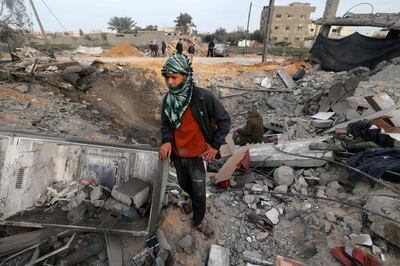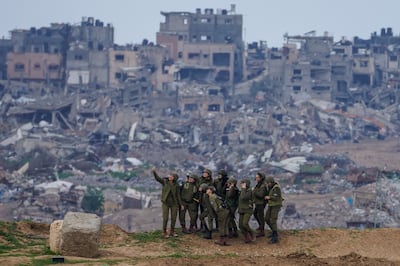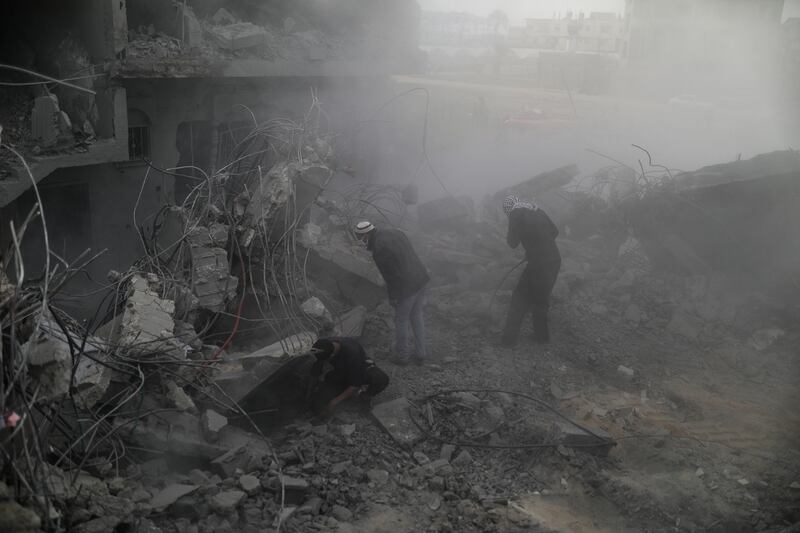Live updates: Follow the latest news on Israel-Gaza
Mediators met in Paris on Friday to begin talks on pausing the war in Gaza and enacting a prisoner and hostage swap between Israel and Hamas, the latest push by the US, Egypt and Qatar to end the conflict, sources with direct knowledge of the proceedings told The National.
The meetings in the French capital came after Hamas set out its terms for a truce in Gaza and the death of at least 50 Palestinians in Israel's latest bombardment of the Palestinian territory.
The talks are being held behind closed doors and are not accessible to the media.
The latest strikes on Gaza are part of an apparent Israeli decision to escalate its four-month-old campaign to pressure Hamas before the much-anticipated talks began, the sources told The National.
In Tel Aviv on Thursday, Israeli officials informed White House co-ordinator for the Middle East and North Africa Brett McGurk that the mandate of the Israeli negotiating team in Paris had been “expanded”, the sources said.
“At the same time, he was told that the Israeli army would increase its military pressure on Hamas until the possible conditions for the return of the prisoners softened,” one source said.
“The latest strikes seem to be related to that decision.”
The sources said mediators from the US, Egypt and Qatar, together with representatives from Mossad and Shin Bet began "preparatory" talks on Friday. They gave no details.
They confirmed Israeli and Egyptian intelligence chiefs had arrived in the French capital.
Mossad director David Barnea and his counterpart at the domestic Shin Bet security agency Ronen Bar are jointly heading the Israeli delegation.
CIA director William Burns and Qatari Prime Minister Sheikh Mohammed bin Abdulrahman will also be attending the talks, the sources said.
They said the latest diplomatic push aims at reaching an agreement before Ramadan begins – on March 10 or 11.
Negotiations held ahead of the Paris meeting were reported to have made tangible progress, they said.
More than 40 people – including women and children – were meanwhile killed in strikes on four houses in central Gaza on Thursday night and early Friday, the Palestinian Wafa news agency reported.
At least 10 other people were killed in Israeli strikes on Rafah in the south and other locations, Wafa said.
Gaza's Health Ministry said about 100 civilians had been killed in the past 24 hours across Gaza.

The Israeli army also stormed Al Zaytoun neighbourhood, south of Gaza city.
“They invaded our home and separated women from men, forced women to go to Rafah, and arrested the men,” Em Fawaz Al Dakka, a 27-year-old resident of the neighbourhood, told The National.
Meanwhile, in the occupied West Bank, a 17-year-old boy was killed on Friday during an Israeli raid on the Jenin refugee camp, Wafa said.
Israel's strikes and ground offensive on Gaza have to date killed more than 29,500 Palestinians, displaced about 85 per cent of the enclave’s 2.3 million residents, and laid waste to much of the enclave.
Fears are also growing that a looming Israeli ground offensive in Rafah, Gaza’s southernmost city on the Egyptian border, could cause huge additional civilian casualties, since about 1.4 million Palestinians have taken refuge there.

Israel began its onslaught against Gaza after Hamas militants attacked southern Israeli communities on October 7, killing about 1,200 people and abducting 240.
The reported progress in negotiations to pause the fighting follows a decision by Hamas to drop its demand for a permanent ceasefire and instead accept a temporary one.
The group also wants international guarantees that the pause will be followed by negotiations to reach a permanent ceasefire.
Previously, Hamas insisted on international guarantees that a permanent ceasefire would follow a pause.
Hamas's vision
After days of intense consultations, Hamas leaders Ismail Haniyeh and Khalil Al Haya left Egypt late on Thursday night following meetings with Egypt’s General Intelligence Directorate, the country’s spy agency that has for years been dealing with relations between Israel and Palestinian factions.
In the course of the talks, according to the sources, Hamas proposed that it initially frees 50 hostages, mostly women, children, the sick and the elderly, in exchange for 3,000 Palestinians held in Israeli prisons on security-linked charges.
Hamas intends to make the release of hostages who are active, male members of the Israeli military conditional on progress in the negotiations for a permanent ceasefire, the sources said.
The discussions between the Egyptians and the Hamas delegation also touched on details of an interim government made up of technocrats to run Gaza when a permanent ceasefire is in place, as well as the reconstruction of the devastated Gaza Strip.
“Hamas has provided Egypt with details of its position on a wide range of outstanding issues so its representative in the Paris talks can confidently speak for Hamas,” said one of the sources. “But the final word on what will be agreed on in Paris rests with Hamas’s leaders.”
As part of the negotiations, Egypt and some of its Gulf Arab allies will start building at least five camps in southern Gaza for displaced Palestinians following the pause, the sources said. Each camp will house as many as 25,000 families, they added.
The camps would provide shelter, humanitarian aid and health care for displaced Palestinians until the reconstruction of northern and central Gaza is complete, they said.
An expanded mandate
The Israeli decision to send its spy chiefs and other diplomats to Paris with an expanded mandate marks a shift as the previous delegation was authorised “only to listen”, diplomatic sources said.
“The US administration put pressure on Prime Minister Benjamin Netanyahu and his government to send the delegation to Paris, and the last of these pressures was through Biden’s envoy and senior adviser, Brett McGurk,” one of the sources said.
“He urged Netanyahu to send the delegation with a serious mandate to complete the negotiations. The Biden administration believes that the continuation of the war during Ramadan may further destabilise the region.”
As the US prepares a UN Security Council resolution that would seek a temporary ceasefire rather than a permanent truce, US President Joe Biden said Hamas does not represent the Palestinian people and the “overwhelming majority” are not affiliated with the group.
“The overwhelming majority of Palestinians are not Hamas,” Mr Biden said on X.
“Hamas does not represent the Palestinian people. In fact, they’re also suffering as a result of Hamas’ terrorism. We need to be clear-eyed about that reality.”






